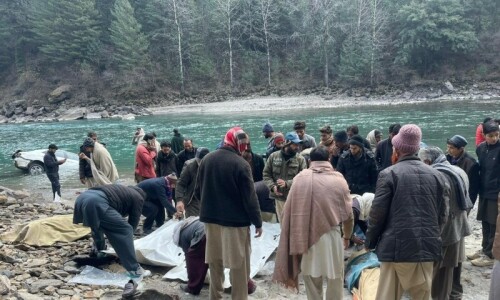Dutch ambassador hosts art exhibition

Ambassador of the Netherlands Jeannette Seppen welcomed a number of diplomats and other guests to her new residence in the Diplomatic Enclave in Islamabad last week, to view an art exhibition depicting the work of 27 artists.
“The exhibition was the idea of the curator, Zara Sajid, who four months ago came up with the idea of a large exhibition where artists could borrow ideas from each other, and where spectators could have a broad display of Pakistani paintings,” Ms Seppen explained.
She added: “The exhibition is not only about individual works. The artists are key contributors to one of the fundamental human rights, notably that of freedom of expression, in Pakistan and all over the world.
She said the artists’ work depicted themes they were passionate about, such as women’s rights or freedom of religion or belief.
“Artists help societies thrive. The artists have the challenge of presenting something original and beautiful,” she said.
A foreign guest who only recently reached Islamabad said she was impressed by the exhibition. “I knew Pakistan had good artists but I wasn’t expecting such high quality,” she said.
Mitsubishi’s representative bids Pakistan farewell

When Ijima Kenzo, the country representative of Mitsubishi in Pakistan, held a farewell dinner in Islamabad a few days ago, the event turned out to be a substantive one on private and public development aid.
Two of the speakers were particularly well-versed in the topic: Imran Shauket and Aysiha Mustafa, both United States citizens.
Mr Shauket said that often, bilateral and multilateral aid is far too expensive, giving examples from his experience of USAID projects in Pakistan, Botswana and Uganda. He said that World Bank’s projects do also not have the positive impact that we think.
Dr Mustafa was optimistic about the private sector’s future role in developing aid, referring to the impressive work of Bill and Melinda Gates, Warren Buffet and others.
“But I don’t believe that the private sector in any foreseeable future will take over from bilateral and multilateral aid,” said a European participant, noting that only about a quarter of aid is private, according to figures from the Organisation for Economic Cooperation and Development. “But if private aid is going to be large, it will be from America,” he added.
Mr Kenzo admitted that the assistance provided by Mitsubishi’s corporate social responsibility to Pakistani communities was quite negligible.
“After all, private companies are not aid organizations but business enterprises,” said another participant, adding that provision of high quality business goods and services, and cooperation, is the role of the private sector. “We rub shoulders with diplomats and other expatriates, but our role is quite concrete, to sell Pajeros and other small and big vehicles.”
Mr Kenzo said he was sad to leave Pakistan after three years in the country. “Yet, I am also glad to return home to Kyoto since my wife and adult children are there,” he added.
— Text and photo by Atle Hetland & Shahbaz Chaudary
Published in Dawn, April 10th, 2017













































Dear visitor, the comments section is undergoing an overhaul and will return soon.